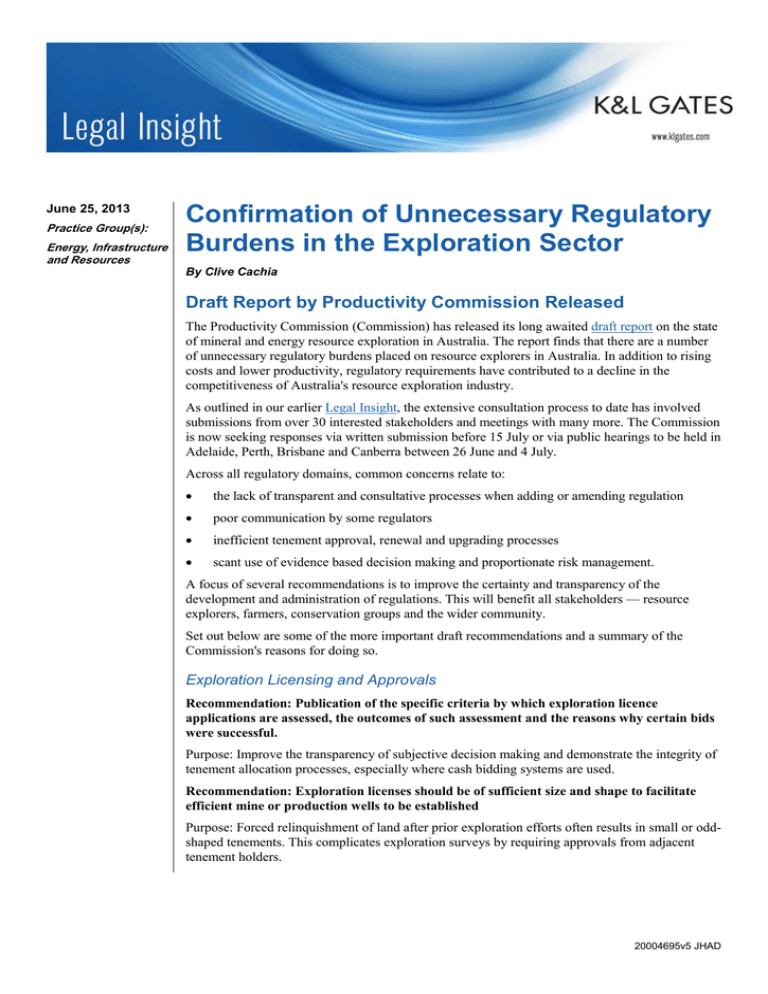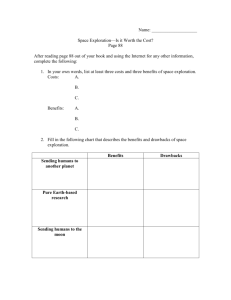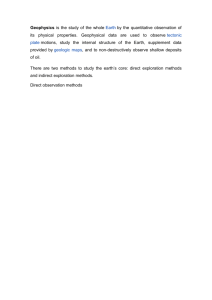
June 25, 2013
Practice Group(s):
Energy, Infrastructure
and Resources
Confirmation of Unnecessary Regulatory
Burdens in the Exploration Sector
By Clive Cachia
Draft Report by Productivity Commission Released
The Productivity Commission (Commission) has released its long awaited draft report on the state
of mineral and energy resource exploration in Australia. The report finds that there are a number
of unnecessary regulatory burdens placed on resource explorers in Australia. In addition to rising
costs and lower productivity, regulatory requirements have contributed to a decline in the
competitiveness of Australia's resource exploration industry.
As outlined in our earlier Legal Insight, the extensive consultation process to date has involved
submissions from over 30 interested stakeholders and meetings with many more. The Commission
is now seeking responses via written submission before 15 July or via public hearings to be held in
Adelaide, Perth, Brisbane and Canberra between 26 June and 4 July.
Across all regulatory domains, common concerns relate to:
the lack of transparent and consultative processes when adding or amending regulation
poor communication by some regulators
inefficient tenement approval, renewal and upgrading processes
scant use of evidence based decision making and proportionate risk management.
A focus of several recommendations is to improve the certainty and transparency of the
development and administration of regulations. This will benefit all stakeholders — resource
explorers, farmers, conservation groups and the wider community.
Set out below are some of the more important draft recommendations and a summary of the
Commission's reasons for doing so.
Exploration Licensing and Approvals
Recommendation: Publication of the specific criteria by which exploration licence
applications are assessed, the outcomes of such assessment and the reasons why certain bids
were successful.
Purpose: Improve the transparency of subjective decision making and demonstrate the integrity of
tenement allocation processes, especially where cash bidding systems are used.
Recommendation: Exploration licenses should be of sufficient size and shape to facilitate
efficient mine or production wells to be established
Purpose: Forced relinquishment of land after prior exploration efforts often results in small or oddshaped tenements. This complicates exploration surveys by requiring approvals from adjacent
tenement holders.
20004695v5 JHAD
Confirmation of Unnecessary Regulatory Burdens in the
Exploration Sector
Recommendation: The reasons for ministerial decisions should be transparent to those
persons to whom the decision relates.
Purpose
To improve confidence in the administrative process
To enable decisions to be properly explained and defended
To foster acceptance by interested stakeholders
To assist any appeal process which may be initiated.
Recommendation: The lead agencies for exploration should be responsible for coordinating
with other agencies, including providing applicants with guidance on a range of approvals
that may be required and how to navigate the approval process
Purpose: Addresses various problems associated with the involvement of multiple government
agencies (eg agencies responsible for heritage, environment, water and land access issues) in
exploration licensing and related approvals, such as delays arising from failing to satisfy
regulatory requirements and being required to re-submit material to regulators.
Recommendation: Regulators should publish target timeframes for approval processes and
provide performance reports against these timeframes on their website
Purpose: Promotes transparency and accountability in assessing exploration licence and renewal
applications with a view to reduce the time needed to process such applications. The draft report
also endorses electronic approval tracking systems (like the Queensland "MyMines" platform) to
improve timeliness and transparency where application volumes make it cost effective.
While not making a separate recommendation, the draft report makes an additional note that
Ministerial approval for a transfer of exploration title should not be a trigger to reassess the title
and add further licence conditions, as in NSW and Tasmania. Rather, such approvals should be
limited to the assessment of the prospective title holder and its compliance with all regulatory
requirements.
Land Access
Recommendation: Governments should use evidence-based analysis of the economic and
social costs and benefits of alternative or shared land use when assessing proposals to
explore in parks and reserves –
Purpose: Ensure that land access for multiple uses is decided upon in accordance with risk so that
relevant stakeholders can make an informed decision or assessment as to the relevant merits of
each competing use. For example, low impact aerial surveys should be permitted so that mineral
resources can be determined. This information can then lead to a more evidence-based assessment
of the conservation vs. development options for the particular area.
Recommendation: The development of coal seam gas (CSG) exploration regulation should
be evidence-based and appropriate to the level of risk
Purpose: While this recommendation lacks any detail to resolve the competing and seemingly
intractable positions of industry and environmental/agricultural groups, it (and the below
recommendations regarding the environment) indicates a preference for regulations to evolve with
improvements in knowledge and understanding of the impacts of this type of exploration. One can
only hope that the outcomes of the current scientific reviews of CSG exploration effects at both
the state and Commonwealth level may be the catalyst for such regulatory reform.
Importantly, the draft report has deferred any recommendations regarding the vexed issue of
competing resource uses between coal and coal seam gas exploration and production. In NSW,
2
Confirmation of Unnecessary Regulatory Burdens in the
Exploration Sector
there is no clear priority of each of these uses under current legislation. The Commission has at
least acknowledged this regulatory tension and has sought additional information before issuing its
final report.
Indigenous Heritage Protection
Recommendation: The Commonwealth's Aboriginal and Torres Strait Islander Heritage
Protection Act 1984 (ATSIHP Act) should be retained whilst state and territory regimes
reach the Commonwealth standard and thereafter should be repealed –
Purpose: Addresses the widespread industry concern about the significant overlap and duplication
between these state/territory and Commonwealth regimes. Initially designed as an interim measure
two decades ago, the ATSIHP Act could serve to accredit state/territory regulations once they
reach an acceptable standard. The ATSIHP Act could then be repealed. The draft report considers
that such an approach would provide an impetus to reform at the state level and ultimately remove
the duplication and uncertainty.
Recommendation: Heritage authorities should require lodgment of all heritage surveys,
maintain registers mapping and listing all known indigenous heritage and ensure sensitive
information is only provided to approved parties for approved purposes
Purpose: Addresses industry claims that a lack of heritage information results in excessive costs
and time delays by having to conduct repeat surveys of the same site. The draft report notes that
concerns regarding copyright (from consultants undertaking the survey) and the release of
culturally sensitive information, could be resolved through agreed protocols to ensure information
is only released to approved persons for an approved purpose.
Environmental Regulation
Recommendation: National Offshore Petroleum Safety and Environmental Management
Authority (NOPSEMA) should undertake environmental assessments and approvals under
the Environment Protection and Biodiversity Conservation Act 1999 (EPBC Act) for
petroleum activities in Commonwealth waters –
Purpose: The draft report acknowledges that duplication exists between the responsibilities of
NOPSEMA under the Offshore Petroleum and Greenhouse Gas Storage Act 2006 and the
Department of Sustainability, Environment, Water, Population and Communities under the EPBC
Act. The overlap relates to petroleum exploration in Commonwealth waters. This has led to
increased costs and delays and even regulators have submitted there has been no additional
environmental protection. The recommendation is to remove duplication which would save time
and expenses for all concerned.
Recommendation: The Commonwealth should strengthen bilateral arrangements with the
states and territories for environmental assessments and accredit state/territory approval
processes where appropriate. State and territory governments should favourably consider
conferring their petroleum related regulatory powers in their waters to NOPSEMA
Purpose: These recommendations are designed to restart the stalled process of removing
duplication of environmental regulation between the states and the Commonwealth. These
recommendations are timely given the passage of legislation last week in the Senate amending the
EPBC Act to allow the Commonwealth, over and above existing state regulatory frameworks, to
conduct environmental assessments of CSG and coal mining proposals where water resources are
potentially affected.
Recommendation: Governments should ensure their environmental exploration regulations
are the minimum necessary, proportionate to the risks involved, focused towards
performance based outcomes and away from prescriptive conditions
3
Confirmation of Unnecessary Regulatory Burdens in the
Exploration Sector
Purpose: Counteracts the recent trend of 'top-down' regulatory creep where mining-related risk
assessment parameters have crept down into exploration activities. Importantly, the Commission
"supports outcomes-based approaches (rather than prescriptive approaches), recognising that
exploration companies will often be in a better position than regulators to identify the most
efficient and effective means to minimize a particular adverse impact"1.
Recommendation: Governments should ensure that where there is scientific uncertainty
regarding the environmental effect of exploration, regulatory settings should evolve with the
best available science and be evidence based
Purpose: Importantly, the draft report suggests that scientific uncertainty does not reduce the need
to conduct a cost-benefit analysis of exploration activities which includes using uncertainty factors
in risk assessments. It goes on to note that uncertainty is but "one factor that should be considered
when deciding whether exploration can reasonably be expected to increase the community's
wellbeing"2.
Next Steps
The Commission's final report will be issued to the Australian Government by September 2013.
The Commission also notes that while exploration represents only a small share of the economy,
its importance is in sustaining Australia’s much larger resource extraction industry. We hope that
whichever government is formed after the next election, its response to the Productivity
Commission's work will be high on its agenda.
Interested parties may comment on the recommendations in draft report in writing by Monday 15
July 2013 or by attending one of the following public hearings:
Adelaide – Wednesday 26 June 2013
Perth – Thursday 27 June 2013
Brisbane – Wednesday 3 July 2013
Canberra – Thursday 4 July 2013
Further details on opportunities for further comment can be found in the draft report on page iii.
Authors:
Clive Cachia
clive.cachia@klgates.com
+61 2 9513 2515
1
2
Draft Report, p.195
Draft Report, p.198
4
Confirmation of Unnecessary Regulatory Burdens in the
Exploration Sector
Anchorage Austin Beijing Berlin Boston Brisbane Brussels Charleston Charlotte Chicago Dallas Doha Dubai Fort Worth Frankfurt
Harrisburg Hong Kong Houston London Los Angeles Melbourne Miami Milan Moscow Newark New York Orange County Palo Alto
Paris Perth Pittsburgh Portland Raleigh Research Triangle Park San Diego San Francisco São Paulo Seattle Seoul Shanghai
Singapore Spokane Sydney Taipei Tokyo Warsaw Washington, D.C. Wilmington
K&L Gates practices out of 48 fully integrated offices located in the United States, Asia, Australia, Europe, the
Middle East and South America and represents leading global corporations, growth and middle-market
companies, capital markets participants and entrepreneurs in every major industry group as well as public
sector entities, educational institutions, philanthropic organizations and individuals. For more information
about K&L Gates or its locations, practices and registrations, visit www.klgates.com.
This publication is for informational purposes and does not contain or convey legal advice. The information herein should not be used or relied upon
in regard to any particular facts or circumstances without first consulting a lawyer.
©2013 K&L Gates LLP. All Rights Reserved.
5




